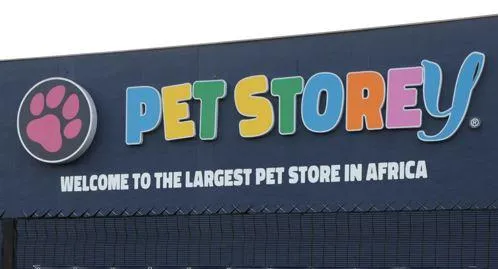
SPAR has announced it will not sell live puppies at its Pet Storey location following public backlash. The retailer emphasises its commitment to animal welfare and responsible pet care.
Image: Supplied.
Over the weekend the SPAR Group has been under growing pressure following public outrage about live puppy sales at one of its Pet Storey stores.
The sequence of events shows how a viral video, consumer backlash and swift changes in strategy played out.
On 19 September, Business Report reported that SPAR had come under fire after a TikTok video posted by @photoman.pierre showed live puppies for sale at a Pet Storey outlet in Boksburg.
Users were critical that the retailer wasn’t working with animal rescue organisations to promote adoption instead of sales.
Responding, Rob Philipson, SPAR’s Business Development Executive, confirmed the store does sell puppies.
He said, “This is the only store where live puppies are sold, and there are no plans to replicate this model in any future roll-out of Pet Storey, we recognise the sensitivities around this and want to assure the public that the health, safety, and welfare of the animals remain our highest priority.”
He added the puppies are “sourced exclusively from breeders who meet stringent welfare and compliance standards. We do not purchase crossbreeds, nor do we support or endorse backyard breeding.”
The retailer, however did not disclose who the breeders were that the puppies were sourced from.
Later the same day SPAR clarified that no more live puppies would be sold at that Pet Storey store, again citing concerns raised by the public.
In a statement Philipson said, “This is the only Pet Storey location where a limited number of puppies were available, and this model will not be replicated in this or any future store. Pet Storey remains primarily a specialised pet product retailer and franchisor, focused on safe, responsible, and accessible pet care.”
He also explained that the current puppies (and kitten) in the store would not be sold in the traditional way but instead “responsibly, safely and permanently rehomed with loving and caring families, while we complete the final transition.”
SPAR also emphasised that “animal welfare is a priority for us, and we are committed to handling this matter with care, compassion, and transparency.”
By Sunday 21 September, SPAR escalated its response.
After intense public outcry and petitions from animal welfare groups, the company announced it would stop selling all live animals, mammals, reptiles, birds, invertebrates at any Pet Storey store.
In the formal statement SPAR said, “We have heard and understand all concerns raised following the launch of our first Pet Storey store in Boksburg. We apologise sincerely for the distress this has caused. We have since made the decision not to sell mammals, reptiles, birds or invertebrates at any Pet Storey store.”
They also reiterated that Pet Storey will refocus on being “a specialised pet product retailer, focused on accessible pet care, products and services, creating a space where pets are invited to visit with their owners and enjoy the experience together.”
Responding to the community of animal welfare advocates, BarkingMad SA, one of the organizations leading the backlash, said, “Thank you everyone that spoke up. You have made a huge difference in the lives of animals by stopping this new franchise of pet stores from selling live animals.”
SPAR’s responses over the weekend show the power of public sentiment in shaping corporate strategy.
What began as a single video escalated into a wider conversation around ethical responsibilities, animal welfare, and what consumers expect from retailers.
SPAR moved from defending a legacy model, to limiting it, to finally withdrawing from live animal sales entirely.
Each step was marked by quotes emphasising welfare, responsibility, and the intention to correct course.
The story underscores how legacy operations (inherited models) can conflict with evolving public values and how brands may need to pivot quickly under pressure.
It also shows that clarity, transparency and response to consumer concerns can become decisive in shaping reputations.
This rapid evolution of SPAR’s strategy demonstrates the increasing potency of public sentiment in influencing corporate practices.
What began as a minor controversy swiftly escalated into a broader dialogue on ethical responsibilities and animal welfare expectations among retailers. SPAR’s transition from defending a traditional business model to ultimately retracting its live animal sales signifies a necessary adaptation to the shifting landscape of consumer values.
As legacy operations often clash with contemporary public expectations, SPAR's experience serves as a cautionary tale for other brands on the importance of transparency, clarity, and responsiveness to consumer concerns. In an age where social media can instantly alter perceptions and drive action, brands must be prepared to pivot quickly in the face of public scrutiny.
BUSINESS REPORT